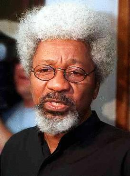Nobel laureate castigates A.U. for silence over Darfur “genocide”
 ADDIS ABABA, July 2, 2004 (dpa) — Nigerian writer and Nobel Prize laureate Wole Soyinka on Friday castigated the African Union (A.U.) for failing to speak up over “horrendous crimes” taking place in Darfur, Sudan.
ADDIS ABABA, July 2, 2004 (dpa) — Nigerian writer and Nobel Prize laureate Wole Soyinka on Friday castigated the African Union (A.U.) for failing to speak up over “horrendous crimes” taking place in Darfur, Sudan.
The African Union and its individual member states should not tolerate the genocide that was taking place in the strife-torn Sudanese region, he said at a press conference in Addis Ababa ahead of next week’s annual A.U. summit.
“They have a duty to denounce genocide,” Soyinka declared angrily, referring to what United Nations officials and human rights activists have desribed as a campaign of ethnic cleansing by government-backed Arab militias against black villagers in Darfur.
The distinguished Nigerian writer, who spoke as a supporter for the cause of Media Freedom in Africa, said African countries should not stay silent out of false solidarity with the Sudanese government.
“This business of solidarity with criminality is a contradiction in terms,” he said, adding: “We cannot accept silence about the horrendous crimes in Darfur for the sake of solidarity with the Sudanese government.”
While he welcomed some A.U. efforts to resolve African conflicts, he insisted the bloc should do better than its predecessor, the Organization of African Unity (OAU), and openly support just causes even if this meant to be critical of member states.
Soyinka also hailed the media for the important role they had in highlighting crimes committed to suppress the aspiration of people in Africa.
The press conference had been called ahead of the impending A.U. summit by organizations demanding more media freedom in Africa, among them CREDO for Freedom of Expression of Associated Rights, FAHAMU, the International Federation of Journalists, the Justice Initiative and the Media Institute of Southern Africa (MISA).
The groups said they had told A.U. Chairperson Alpha Oumar Konare in a meeting Thursday that “a legal and institutional framework for a conducive media environment” was urgently needed in Africa.
To this end, the A.U. should act urgently to denounce all media legislation in member states which was inconsistent with the A.U.’s constitution and to adopt treaty-level guarantees for media freedom, said CREDO-coordinator Rotimi Sankore.
“The lack of press freedom and freedom of expression is holding back the development of Africa on a democratic basis,” said Sankore said.
The Director of the Africa Office of the International Federation of Journalists, Gabriel Baglo, singled out Eritrea and Zimbabwe as the “worst offenders” against press freedom in Africa.
In Eritrea, the entire independent press had been shut down and all editors thrown into jail two years ago, he said. Zimbabwe had also shut down its independent media and recently imposed a new law for controlling people’s freedom of expression and the freedom of the press.
Ghana, in turn, was as a good example for press freedom in Africa, as it recently abolished a Criminal Defamation Act.
In Ethiopia, a revised draft press law submitted to parliament by the Ministry of Information should be reconsidered in view of the fact that the country was the seat of the A.U., he said.
“Ethiopia should have a Press Law that could serve as an example to other A.U. members,” Baglo observed.
